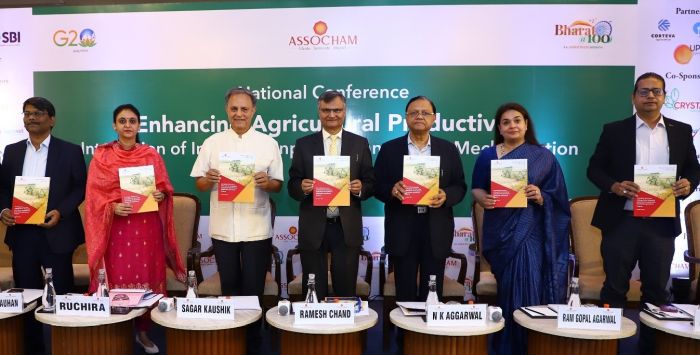New Delhi: Private sector can play a critical role in precision farming through the application of appropriate technology and tools, said Prof. Ramesh Chand, Member, NITI Aayog at the National Conference on ‘Enhancing Agricultural Productivity: Integration of Improved Inputs, Technology & Mechanization.’ The conference was organised by the Associated Chambers of Commerce and Industry (ASSOCHAM) in New Delhi today.
He emphasised the importance of partnership between the private and government sectors for long-term agricultural growth, saying, “The private sector can provide precision farming solutions through advisory services, climate-smart agricultural inputs, and suitable technology to support agricultural development.”
In his keynote speech, Prof. Ramesh Chand highlighted the “excellent growth” seen in India’s agriculture sector, notably in livestock and fisheries, with an annual increase of roughly 2.75 per cent. He recognised the issues faced by climate change and its impact on productivity, irrigation, and biological processes. Prof. Chand elaborated on the complex interaction between agriculture and climate change, emphasising the significance of cautious management and adaptation techniques. “The real challenge lies in increasing productivity,” he said. “To do so, we must address concerns of cost, technological progress, and resource efficiency.”
You may also like to read: IIL’s Japanese collaboration brings out innovative crop protection solutions; files 11 patents in 10 years
He also highlighted small-scale farmers’ dominance in India’s agricultural environment, as well as the necessity to tackle data privacy, market structure, and scalability difficulties.
“When we talk about our picture, we can proudly say that India’s diversity is its strength. Farmers form a significant part of this diversity,” he said. Ramesh Chand emphasised the need for new ways to boost agricultural output, recognising the country’s wide range of agricultural practices, from traditional methods in states like Karnataka to sophisticated high-tech agriculture.
While delivering the welcome address, Sagar Kaushik, Chairman ASSOCHAM National Council on Chemicals & Petrochemicals and President – Global Corporate & Industry Affairs, UPL elucidated on the importance of connecting farmers with customers in a sustainable way, bringing access to technology for farmers, mitigating climate change as a new hurdle for research.
You may also like to read: International Tractors launches 5 new tractor series; targets to double its global sales in next 3 years
Speaking at the conference, Ruchira Saini, Government and Industry Affairs Lead at Corteva Agriscience focused on the plans for the next 25 years, a long-term vision and prioritisation of productivity-led growth in agriculture with the foundation of sustainability and climate-smart technologies. A conducive policy ecosystem around new-age technology which solves ground-level issues of small and marginal farmers is of paramount importance.
NK Aggarwal, Co-Chairman, ASSOCHAM National Council on Agriculture and Farming Inputs and Chairman Crystal Crop Protection shared his insights on agricultural productivity to contribute to a more sustainable and resilient food value chain.
ASSOCHAM-Nangia Anderson joint knowledge report titled “Harvesting Tomorrow: A blueprint for enhancing agricultural productivity & sustainable agricultural progress” was unveiled during the national conference on enhancing agricultural productivity.





